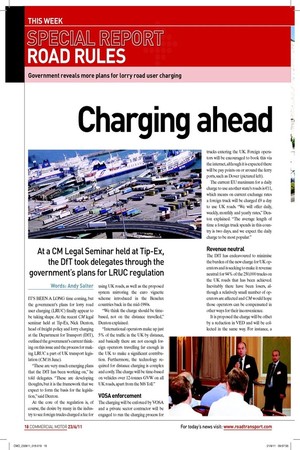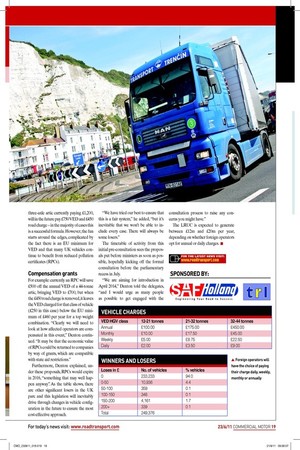Charging ahead
Page 15

Page 16

If you've noticed an error in this article please click here to report it so we can fix it.
At a CM Legal Seminar held at Tip-Ex, the DfT took delegates through the government’s plans for LRUC regulation
Words: Andy Salter
IT’S BEEN A LONG time coming, but the government’s plans for lorry road user charging (LRUC) inally appear to be taking shape. At the recent CM legal seminar held at Tip-Ex, Nick Denton, head of freight policy and lorry charging at the Department for Transport (DfT), outlined the government’s current thinking on this issue and the process for making LRUC a part of UK transport legislation (CM 16 June).
“These are very much emerging plans that the DfT has been working on,” he told delegates. “These are developing thoughts, but it is the framework that we expect to form the basis for the legislation,” said Denton.
At the core of the regulation is, of course, the desire by many in the industry to see foreign trucks charged a fee for using UK roads, as well as the proposed system mirroring the euro vignette scheme introduced in the Benelux countries back in the mid-1990s.
“We think the charge should be timebased, not on the distance travelled,” Denton explained.
“International operators make up just 5% of the trafic in the UK by distance, and basically there are not enough foreign operators travelling far enough in the UK to make a signiicant contribution. Furthermore, the technology required for distance charging is complex and costly. The charge will be time-based on vehicles over 12-tonnes GVW on all UK roads, apart from the M6 Toll.”
VOSA enforcement
The charging will be enforced by VOSA and a private sector contractor will be engaged to run the charging process for trucks entering the UK. Foreign operators will be encouraged to book this via the internet, although it is expected there will be pay points on or around the ferry ports, such as Dover (pictured left).
The current EU maximum for a daily charge to use another state’s roads is €11, which means on current exchange rates a foreign truck will be charged £9 a day to use UK roads. “We will offer daily, weekly, monthly and yearly rates,” Denton explained. “The average length of time a foreign truck spends in this country is two days, and we expect the daily charge to be most popular.”
Revenue neutral
The DfT has endeavoured to minimise the burden of the new charge for UK operators and is seeking to make it revenue neutral: for 94% of the 250,000 trucks on the UK roads that has been achieved. Inevitably there have been losers, although a relatively small number of operators are affected and CM would hope those operators can be compensated in other ways for their inconvenience.
It is proposed the charge will be offset by a reduction in VED and will be collected in the same way. For instance, a three-axle artic currently paying £1,200, will in the future pay £750 VED and £450 road charge – in the majority of cases this is a successful formula. However, the fun starts around the edges, complicated by the fact there is an EU minimum for VED and that many UK vehicles continue to beneit from reduced pollution certiicates (RPCs).
Compensation grants
For example: currently an RPC will save £500 off the annual VED of a 44-tonne artic, bringing VED to £700, but when the £450 road charge is removed, it leaves the VED charged for that class of vehicle (£250 in this case) below the EU minimum of £460 per year for a top weight combination. “Clearly we will need to look at how affected operators are compensated in this event,” Denton continued. “It may be that the economic value of RPCs could be returned to companies by way of grants, which are compatible with state aid restrictions.” Furthermore, Denton explained, under these proposals, RPCs would expire in 2016, “something that may well happen anyway”. As the table shows, there are other signiicant losers in the UK parc and this legislation will inevitably drive through changes in vehicle coniguration in the future to ensure the most cost-effective approach. “We have tried our best to ensure that this is a fair system,” he added, “but it’s inevitable that we won’t be able to include every case. There will always be some losers.” The timetable of activity from this initial pre-consultation sees the proposals put before ministers as soon as possible, hopefully kicking off the formal consultation before the parliamentary recess in July.
“We are aiming for introduction in April 2014,” Denton told the delegates, “and I would urge as many people as possible to get engaged with the consultation process to raise any concerns you might have.”
The LRUC is expected to generate between £12m and £20m per year, depending on whether foreign operators opt for annual or daily charges. ■
FOR THE LATEST NEWS VISIT:
www.roadtransport.com













































